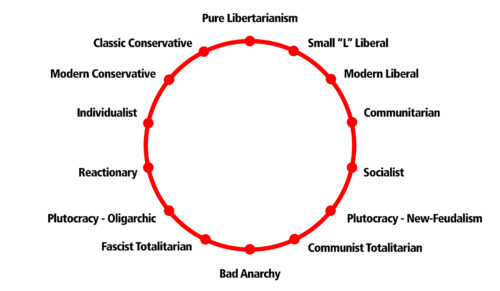Power is a zero-sum game. Base power doesn’t grow or diminish depending upon current conditions or the vagaries of transient situations – it remains a set singularity that can never be multiplied, only divided, meaning that gaining power by definition comes only from the loss of power by another group or person or ideology.
Power can be used in different ways and sought for different reasons. It can be wielded actively and aggressively or quietly and minimally. It can be sought to be used or it can be sought to prevent its use by another.
While policies and procedures and constructs may come and go, the attitude towards exactly what is power by those who wield it must be at the center of any discussion of why those policies and procedures and constructs are supported and implemented.
For some time, the perception of political ideologies – usually driven by an impression created by specific policies – has been depicted in a linear fashion, from right to left and back again. But that interpretation has one very glaring problem – the core attitudes towards the use of power begin to converge at the margins and both far left and right become indistinguishable from one another save for the outer trappings. Even though the far left would like to be seen as closer in sprit to the center-left, it is in fact far closer to the far right, and vice-versa.
This warping of political power constructs, caused by the competition between the group and the individual, becomes even more readily apparent when one realizes that with the recent seeming crumbling of the “middle” there can be no left or right as once defined.
To that end, it may behoove society to start viewing politics through a more circular lens that properly reflects attitudes towards power itself and the philosophies of control that arise from such various interpretations.
And, to start, here is that circle:

POLITICAL CIRCLE DEFINITIONS, with as appropriate as possible examples:
- Bad Anarchy (Ochlocracy) – Chaotic, mob-centered (but not ruled), survival of the fittest, exclusionary beyond a close circle of co-dependents, elimination of societal norms, mayhem (think Antifa, or Portland on a bad night)
- Good Anarchy (Pure Libertarian) – Self-reliance without self-indulgence, peaceful exchange of ideas, common, courteous, and safe societal norms ingrained in each individual obviating the need for societal governance structures, live and let live, respectful egalitarianism (think Utopia, or what Portland erroneously used to think of itself as)
- Fascist Totalitarianism – State control of all aspects of individual life, constant oppression of an ever-shifting definition of an othered group, theoretically corporatist, absolute allegiance required, societal expectation of enforceable conformity (Nazi Germany)
- Communist Totalitarianism – State control of all aspects of individual life, constant oppression of an ever-shifting definition of an othered group, theoretically egalitarian , absolute allegiance required, societal expectation of enforceable conformity (Stalinist Russia)
- Plutocracy (Oligarchic/Corporatist) – Corporate/state enmeshment, ill-defined welfare state structure for willing society members coupled with societal and economic ostracization/oppression of the unwilling, kleptocrat tolerant, general indoctrination of the purposefully distracted masses by class of owners and their servants/enablers (Russia, or any number of The ‘Stans’ today)
- Plutocracy (Neo-Feudal/Corporatist) – Hierarchical through club membership, subsistence of the masses through indirect enslavement, belief in the personal betterness and selflessness of ruling class to provide theoretical moral/ethical underpinning to status quo, a collaborationist media and cultural component, educational and other opportunities limited to those determined to be entitled and/or potentially useful to the hierarchy (California today)
- Reactionary – Societal interactions viewed through a lens of generalized iconoclastic resistance, large-scale change is stifled, cult of the individual construct, strict but self-indulgent norms (the guy at the end of the bar in northern Idaho)
- Socialist – Society governance viewed as a necessary imposed greater good, pre-approved individualism encouraged, distribution of goods and services controlled to appear to be equitable, a strict but usually soft hand used in societal control (Britain in the 1970s on a bad day, or Sweden on a good day)
- Individualist – Society and governance based upon the concept of the primacy of the well-being of the individual with limits defined by a theoretically fluid leadership, limited public censure of personal actions (practical Libertarianism)
- Communitarian – Society and governance based upon the concept of the primacy of the well-being of the community as defined by an entrenched leadership, significant public censure of personal behavior deemed as anti-social (currently referred to as woke/progressive; formerly referred to as Puritan)
- Modern Conservative – The imposition on society of personal beliefs usually rooted in somewhat limited social expression and a lack of aggressive exploration of novel concepts, a somewhat strict ethno-religious underpinning, personal comfort seen as leading to societal comfort, diversity of opinions tolerated but rarely accepted (religious right)
- Modern Liberal – Society and governance based upon group as opposed to individual responsibility, tolerant of diverse opinions but rarely incorporating them programmatically, limited personal leeway to shift group adherences and identifications, societal ability to shift putatively non-political group adherences and personal identifications at will (statist left)
- Classic Conservative – Personal freedom of expression and action encouraged within broadly defined appropriate societal limits, preference for steady-state societal solutions, willing to actively consider new concepts and ideas but hesitant to implement without significant evidentiary support, understanding of basic fact of societal evolution, particularly averse to concentration of new centers of power (Bill Buckley)
- Classic “Small L” Liberal – Personal freedom of expression and action encouraged within broadly defined appropriate societal limits, preference for innovative concepts and societal solutions, willing to assist/encourage societal evolution, usually averse to concentration of power but tolerates on occasion (there has to be someone, something but it escapes me at the moment)
There can be a certain fluidity to these definitions and there is definitely a degree of overlap, but by approaching the spectrum first through the idea of power one can come closer to a more accurate picture of the current political landscape.
As to the practical impacts these “starting points” have, it may be best to those in the context of certain issues facing the public – and lawmakers – today.
First, let’s look at the concept of ending the Senate filibuster. While all of the above groups would, at some level deep down, possibly like to end the practice, whether or not they would actually do so is telling. The filibuster is about, at its heart, protecting transitorily minoritized viewpoints and enshrining the idea that power itself should be a shared thing. Therefore, anyone or any group opposing that basic sense of “sharedness” by definition falls toward the bottom of the above circle, the part of the circle that limits the access of others to power. This would include oligarchies, authoritarians, reactionaries, and communitarians, in part at least because of these groups inability to accept that valid differences of opinions can exist.
This same argument can be made in respect to the establishment of speech codes and/or the desire to pre-emptively limit what can be said by those who may be in opposition. A crucial aspect of any totalitarian political culture is the outright control of speech and thought, or at least the emplacement of norms and strictures to best ensure that such thoughts and speech conform to the wishes of the empowered group – see here. Therefore, the attitude towards speech should strongly inform the public of the true nature of a political (or social, as these differing political personality types described can be applied outside of a strictly governance environment) movement as very few authoritarian regimes are absolutely honestly upfront about their eventual actual intentions (except, it seems, China).
Second, the idea of centralizing power is, forgive me, central to the continued success of the more totalitarian designations. The more focused a regime is, the easier it is to control the (fewer and fewer) power levers of society. To echo Caligula (or Nero or Stalin – either way not the best company to be in) things would truly have been easier for him if in fact “Rome had only one neck to strangle.” Of course, that means the best way to thwart that desire is to create as many levers of power as possible by encouraging more people to “stick their necks out,” thereby creating an endless game of political Whack-a-Mole that even the most dedicated dictator and the most proud progressive will eventually lose.
And this attitude towards centralization does not have to be openly and specifically all-encompassing to have an impact, to advance the cause, as it were. Just recently, California stripped (or at least lessened) cities and counties – local, diffuse government – of a number of their key land use and zoning powers arguing that the move would increase construction and lower housing costs (it won’t, by the way). This may seem to be a bit esoteric, but in fact it goes to the heart of the issue of centralization – when local land use issues were involved, it has almost always deemed best to leave such decision making in local hands.
Obviously, when those decisions were taken out of spite or due to bribery, incredibly harmful to the common good, or racially motivated, higher powers should, could, and eventually did, step in. But to preemptively make such decisions at the state or federal level is not only extremely problematic but goes to the heart of local community self-determination. One can look at Biden administration’s attitude towards local zoning and the effort they have put into “legalizing housing” by dangling cash in front of strapped municipalities. This is anathema to more individualistic political concepts, though we shall put aside for now the correlation between voting patterns in communities with higher housing densities that tend to benefit Democrat candidates.
Third, the desire to have the ability to strongly and specifically gate-keep access to power is another indicator of being politically closer to the bottom of the circle. Take, for example, the idea of setting up a “citizen’s commission” to study, say, a local watershed issue. For those on the more individualistic side of the circle, this would involve (if one can be convinced to see the point in having one in the first place) a relatively open enrollment process. People would apply and most likely be interviewed to make sure they do not have a financial conflict or are just plain batty (no matter how much stock one puts in the rights and abilities of the individual, it is okay to not have people who think fish have legs or are true W.C. Fields aficionados on this particular committee).
Again, this may seem rather prosaic, but all sides active in the political realm do delve into the minutiae to seek avenues towards more and to protect existing power structures. Gatekeeping to gain advantage can also be made to seem not only harmless but actually as a form of power distribution, which is very convenient for those seeking to in fact retain control while appearing to be open to all possible outcomes.
This raises the issue of the concept of the “stakeholder,” the all-too-common term for people and/or entities who already have a vested interest in an issue but wish to be seen merely as disinterested experts. While actual neutral expert opinion is important and should be involved, a designated stakeholder will first and foremost fight for their own benefit rather than look for the “best” solution. While totalitarian systems pretty much eschew the public committee process, communitarian and “friendly” oligarchical systems will use them often to both provide a sheen of respectability and to reward and/or create political allyship with various groups, such as non-governmental organizations, academia, social service providers, and such. Simply put, , if you are not at the table, you are dinner.
An aside on task forces and blue-ribbon commissions in general, there are four types/reasons they are created. First, and most rarely, they are created to actually look closely at a complex problem removed from the daily political give-and-take and come up with a solution. Second, they are set up to avoid – or at least delay – making what could be perceived as a controversial decision. Third, they are created in response to public pressure on an issue that the creators do not want to actually deal with – upon completion, the report of the board is accepted by the governing body which then cherry picks one or two of the easiest/most milquetoast recommendations to implement and then files the report away never to be seen again while being able to publicly claim they handled the issue and made changes to address the problem. Fourth, they are created with a specific outcome in mind and are packed with experts and “stakeholders” who receive additional power and prestige just by being included in the discussion and who are known to already agree in principle with whatever that outcome is supposed to be. That way the governing body, upon the issuance of the report, has what is known in the public relations field as “third party validation” and can then move forward with even the most controversial plan while claiming they are “just doing what the experts say,” no matter how unpopular the idea may be (see pandemic response.)
Fourth, the attitude towards the necessity and implementation of a societal “safety net” is also an indicator of views on power constructs. While the movements toward the top of the circle all admit – either quite grudgingly or rather enthusiastically – the need for some sort of protection of last resort, there is also a concomitant sense of “bootstrapism.” By encouraging or at least allowing for an element of self-reliance, each of these concepts place individual need, wants, and differences somewhere near the center of their philosophies.
While the totalitarian systems demand absolute allegiance in exchange for (however limited and ramshackle and deadly) a comprehensive social welfare scheme, the other concepts are a bit murkier to define. Individualism calls for the absolute minimum of community financial support and reactionary constructs aggressively negate the need and/or propriety of any such system and see any such community demands as proof of their own personal superiority.
But such systems play key roles in plutocratic/communitarian movements. The neo-feudal oligarch expands the safety net to a point from which, unless one ascends into the hierarchy itself, it becomes almost impossible to escape (note – this concept goes beyond mere financial support and trades heavily on social approval and the like). The more kleptocratic plutocracies tend to not bother with the niceties of the patina of social propriety but do maintain a significant service system. Both plutocracies emphasize and laud the acts of personal generosity – either bread or circuses or both – of the hierarchy to those less well-off. But it is key to note that that “giving” is not merely an act of kindness but almost always tied to the image and the needs and continued power of the hierarchy in question – see here.
That “giving to gain” also imbues the communitarian and, to a lesser extent the socialist, movements a sense of moral superiority, the main difference being that in government it is other people’s money being used to gain political and societal power. While communitarians rightly decry the idea of letting a person wither away and eventually cease to be because of a reactionary lack of any societal support, the soft strangulation of a ceaseless safety net is not only acceptable to them but a key strategy to gain and keep power by creating an atmosphere of simultaneous dependence and entitlement.
Whether by design or (un)happy accident, any move to domesticate or “house break” or infantilize a populace by any means – speech codes, safety obsessions, enforced caretaking, etc. – by definition will only benefit any and all authoritarian movements. For the observant, those stances are an unwitting but useful “tell,” to use a poker term, about the true ultimate intent of any movement and/or its adherents as those movements do tend to hide their overarching motivations (again, except, it seems, China.)
Finally, the difference between acting in harmony organically and acting in concert at another’s behest should be addressed. Acting in harmony involves discrete individuals independently making similar decisions to reach a target; acting in concert involves organizational intent to move towards a specific goal. The individualistic constructs approve (or at least tolerate) of people acting in harmony but are wary of those acting in concert; the communitarian constructs, however, tend to have an exact opposite view – acting from an individual construct but in harmony implies a dangerous independence of spirit that can threaten their power.
In other words, there is a world of difference in a community coming together naturally (which more individualistic constructs tolerate the concept of even when they vehemently disagree on the issue at hand) and a leader calling for unity in the community to support a particular idea (as the more communitarian constructs tend to see the need for an imposed organizational structure and are very wary of spontaneous independent activity). It is true, dangerously, that real “grass roots” (let alone the fake “astroturf” public relations scams) efforts can be hijacked, glommed on to, or have their “positive glow” co-opted by those who see them as an opportunity to gain and/or solidify power; sadly, this peril is far too often overlooked by the initial movers.
A possible example of the difference between “in harmony” and “in concert” could be seen in the discussion of the “deep state” and its opposition to President Trump. Considering that Trump was threatening the power, social standing, and financial stability of a million or so of the most comfortably confident people in the nation, there was in fact no need for all of the “swamp” denizens to get together and have a meeting to decide how to stop him, no need for an active outside controlling force. One can be assured that certain shadowy discussions occurred (spycraft isn’t the world’s second oldest profession for nothing), but a grand planned scheme was unnecessary. While being able to smugly tell themselves (and the nation) that they were fighting for democracy, they were in fact fighting for their mortgage payments, for their continued presence on the invitation lists of the best brunches, and to keep their kids from having to go to public school. In that situation, conspiracy is simply redundant, but the advantage given to his political enemies was/is incalculable (see hijack reference above).
The idea of left and right are deeply entrenched in the global popular imagination. But as the world becomes smaller and, oddly, both more closely interconnected and drastically further apart, a revision of that construct is in order to allow for a better understanding of the motivations behind the ideas of leadership and power and the societal hazards inherent in authoritarian constructs, no matter “right” or “left.”
And just maybe, in that circle, there is peace at the center.
PHOTO: Karl Marx stature in Trier. Photo by Max Gerlach. Attribution-ShareAlike 2.0 Generic (CC BY-SA 2.0).

Thomas Buckley
Thomas Buckley is the former mayor of Lake Elsinore, California and a former newspaper reporter. He is currently the operator of a small communications and planning consultancy and can be reached directly at planbuckley@gmail.com. You can read more of his work at: https://thomas699.substack.com/





